TABLE OF CONTENTS
- 1.Introduction
- 2.What is a White Label Sports Betting Platform?
- 3.What is a Turnkey Sports Betting Platform?
- 4.What is an API Sports Betting Platform?
- 5.White Label vs Turnkey vs API: Which is the Best Option?
- 6.Pros and Cons of Each Type of Platform
- 7.Size of the Opportunity
- 8.Importance of Reliability in Sportsbook Platforms
- 9.Conclusion
- 10.FAQs
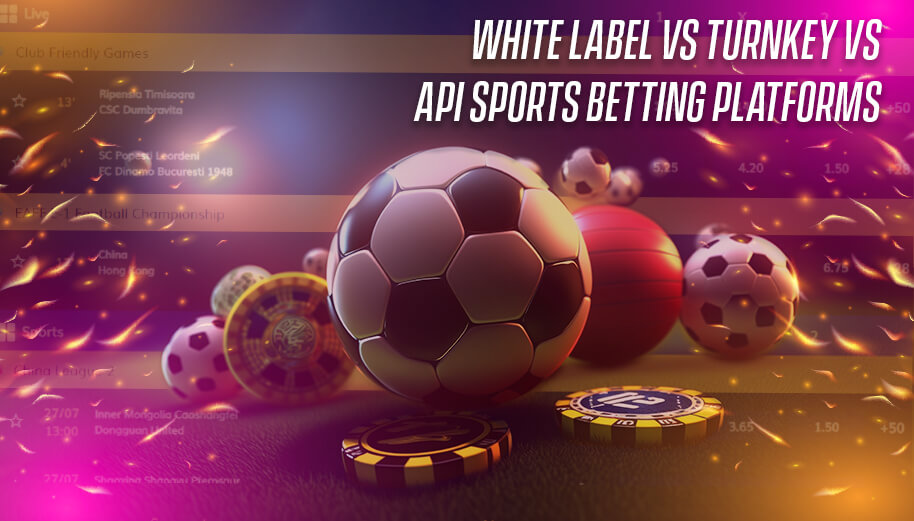
What is an iGaming Betting Platform?
An iGaming betting platform is a software solution that enables businesses to offer online betting services to their customers. These platforms provide a range of features and functionalities, including the ability to create and manage user accounts, accept and process bets, and offer a variety of betting options across different sports and events.
It’s important to check the important aspects when choosing the right type of sports betting platform which is critical to the success of your business. Each type of platform has its own advantages and disadvantages, and you need to consider factors such as your budget, timeline, and technical expertise when making a decision. If you are a startup or smaller operator, a white label or turnkey solution may be the best option as it provides a quicker and more cost-effective way to enter the market. However, if you have the resources and expertise to develop your own platform, an API solution may be the best choice as it provides maximum flexibility and control.
What is a White Label Sports Betting Platform?
A white label sports betting platform is a fully managed solution that allows businesses to launch their own branded sportsbook without having to develop the underlying technology themselves. With a white label solution, the provider takes care of everything from licensing to hosting and customer support, leaving the business to focus on marketing and acquiring customers. White label solutions have become increasingly popular in the iGaming industry due to their cost-effectiveness and speed of deployment.
Advantages of using a White Label Sports Betting Platform
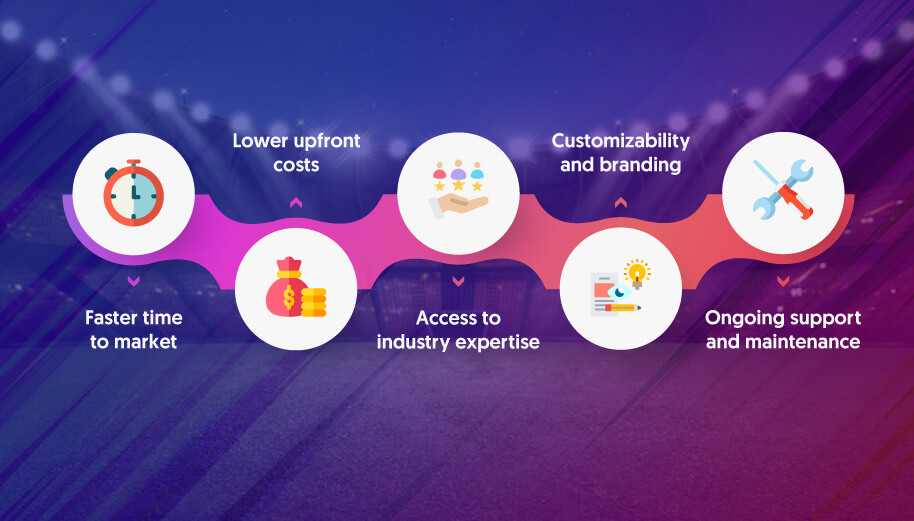

Faster time to market
One of the key advantages of using a white label sports betting platform is the speed at which businesses can enter the market. Developing a sports betting platform from scratch can take months or even years, and requires a significant investment in time and resources. By using a white label solution, businesses can launch their own sportsbook in a matter of weeks, allowing them to start generating revenue quickly.

Lower upfront costs
Developing a sports betting platform from scratch can be prohibitively expensive for many businesses, particularly startups and smaller operators. White label solutions offer a more cost-effective option, as the provider takes care of the development and maintenance of the platform, leaving the business to focus on marketing and acquiring customers. This can significantly reduce upfront costs and enable businesses to enter the market with a smaller initial investment.

Access to industry expertise
White label solutions are typically provided by experienced sports betting software providers who have a deep understanding of the industry and its regulations. This expertise can be invaluable for businesses that are new to the market or unfamiliar with the intricacies of sports betting. Providers can offer guidance on everything from licensing and compliance to marketing and customer acquisition, helping businesses to get up and running quickly and efficiently.

Customizability and branding
Despite being a pre-built solution, white label sports betting platforms offer a high degree of customizability, allowing businesses to tailor the platform to their specific needs and target audience. This includes branding and design, as well as the ability to add or remove specific features and functionalities. This can help businesses to differentiate themselves from their competitors and create a unique brand identity that resonates with their customers.

Ongoing support and maintenance
Another advantage of using a white label sports betting platform is the ongoing support and maintenance provided by the provider. This includes everything from customer support to software updates and maintenance. By outsourcing these tasks to a third-party provider, businesses can free up their own resources and focus on other areas of their operations.
What is a Turnkey Sports Betting Platform?
A turnkey sports betting platform is a comprehensive solution that allows businesses to build their own sportsbook from the ground up. Unlike white label solutions, turnkey platforms provide businesses with complete control over the platform’s development and customization. Turnkey solutions require a higher level of technical expertise and investment, but offer a greater degree of flexibility and control.
A turnkey sports betting platform is a fully customizable solution that provides businesses with complete control over the development, customization, and branding of their sportsbook. Turnkey solutions are typically provided by sports betting software providers, who offer a suite of tools and technologies that businesses can use to build their own platform. Turnkey solutions require a higher level of technical expertise and investment than white label solutions, but offer a greater degree of flexibility and control.
Advantages of using a Turnkey Sports Betting Platform
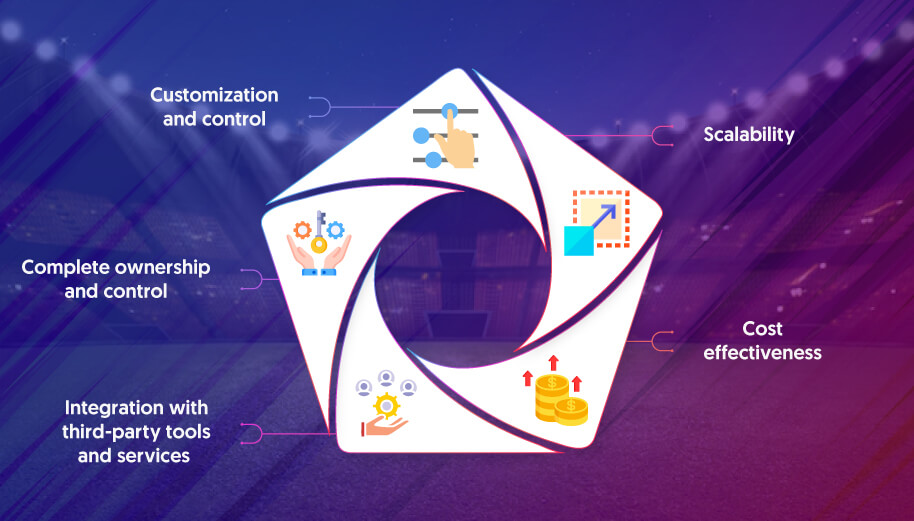
Customization and control
One of the main advantages of using a turnkey sports betting platform is the level of customization and control it offers. Unlike white label solutions, turnkey platforms provide businesses with complete control over the development and customization of their sportsbook. This includes the ability to design the platform's user interface, add or remove specific features and functionalities, and integrate with third-party tools and services. This level of control can help businesses to create a unique brand identity that sets them apart from their competitors.
Scalability
Turnkey solutions are designed to be scalable, meaning they can grow and evolve as a business expands. This is particularly important for businesses that are just starting out and may not have a clear idea of their long-term needs. Turnkey platforms can be customized to meet the needs of businesses of all sizes, from small startups to large enterprises. This scalability can help businesses to save on costs in the short term while also ensuring they have the tools and resources they need to grow and expand over time.
Cost-effectiveness
Despite requiring a higher level of investment than white label solutions, turnkey platforms can be more cost-effective over the long term. This is because businesses are not limited by the features and functionalities of a pre-built platform, and can instead tailor the platform to their specific needs and budget. This can help businesses to save on costs in the long term, as they are not paying for features or services they don't need.
Integration with third-party tools and services
Another advantage of using a turnkey sports betting platform is the ability to integrate with third-party tools and services. This includes everything from payment processors to customer relationship management tools. By integrating with third-party tools and services, businesses can create a more streamlined and efficient workflow, reducing the need for manual intervention and improving overall efficiency.
Complete ownership and control
Perhaps the biggest advantage of using a turnkey sports betting platform is the complete ownership and control it provides. Unlike white label solutions, businesses own the platform outright and can make changes and updates as needed. This provides businesses with complete control over their sportsbook, allowing them to tailor the platform to their specific needs and target audience.
What is an API Sports Betting Platform?
Advantages of using an API Sports Betting Platform

Flexibility
One of the main advantages of using an API sports betting platform is the flexibility it provides. Businesses can integrate sports betting functionality into their existing software or applications, allowing them to provide a more comprehensive user experience without having to switch between multiple platforms. This can help to improve overall user engagement and retention, as users are able to access all the features and functionality they need from a single platform.
Faster time-to-market
API sports betting platforms can be integrated into existing software or applications relatively quickly, allowing businesses to bring their sports betting offerings to market faster than building a platform from scratch. This is particularly important in the highly competitive iGaming industry, where time-to-market can be a critical factor in the success of a product or service.
Reduced development costs
Integrating with an API sports betting platform can be a more cost-effective option for businesses than building their own platform from scratch. This is because businesses do not need to invest in the development of a new platform, but can instead leverage the functionality and features of an existing platform through standardized APIs. This can help to reduce development costs and speed up the time-to-market of new sports betting products and services.
Access to specialized expertise
API sports betting platforms are typically provided by sports betting software providers who have specialized expertise in the development and maintenance of sports betting platforms. By integrating with an API platform, businesses can leverage this expertise without having to build their own team of developers or technical experts. This can help to ensure that businesses are able to provide a high-quality user experience without having to invest in specialized expertise.
Scalability
API sports betting platforms are designed to be scalable, meaning they can grow and evolve as a business expands. This is particularly important for businesses that are just starting out and may not have a clear idea of their long-term needs. API platforms can be customized to meet the needs of businesses of all sizes, from small startups to large enterprises. This scalability can help businesses to save on costs in the short term while also ensuring they have the tools and resources they need to grow and expand over time.
White Label vs Turnkey vs API: Which is the Best Option?
Comparison of the Three Types of Sports Betting Platforms

White Label Sports Betting Platforms
White label sports betting platforms are third-party products or services offered by a sports betting software provider to online bookmakers. The bookmakers can rebrand the product and customize it to their needs without worrying about developing a sportsbook from scratch. White label products are the most popular sports betting platform solutions in the iGaming industry.

Turnkey Sports Betting Platforms
Turnkey sports betting platforms are fully managed solutions that offer bookmakers a comprehensive package. They come with a ready-made sportsbook and include software, hardware, payment processing, and customer support services. Turnkey solutions are ideal for entrepreneurs who are looking to launch a new online sports betting business quickly.

API Sports Betting Platforms
API sports betting platforms provide bookmakers with an application programming interface (API) that allows them to build their sportsbook from scratch. With API solutions, bookmakers can access odds and other relevant data from the sports betting software provider and integrate it into their platform. API solutions provide bookmakers with more control and flexibility over their sportsbook's design and functionality.

Factors to Consider when Choosing a Platform
- Cost: The cost of the platform is a crucial factor to consider. White label solutions are often the most affordable option, while turnkey solutions tend to be the most expensive.
- Customization: Customization options are essential, as they allow bookmakers to tailor the platform to their needs. White label solutions offer moderate customization, while turnkey and API solutions provide more customization options.
- Time to market: Time to market is another factor to consider, especially for entrepreneurs looking to launch a sports betting business quickly. Turnkey solutions offer the quickest time to market, followed by white label solutions and API solutions.
- Support and maintenance: Bookmakers must choose a platform that offers reliable support and maintenance services. Turnkey solutions often come with a dedicated support team, while white label and API solutions may require additional support.
Pros and Cons of Each Type of Platform
White Label Sports Betting Platforms
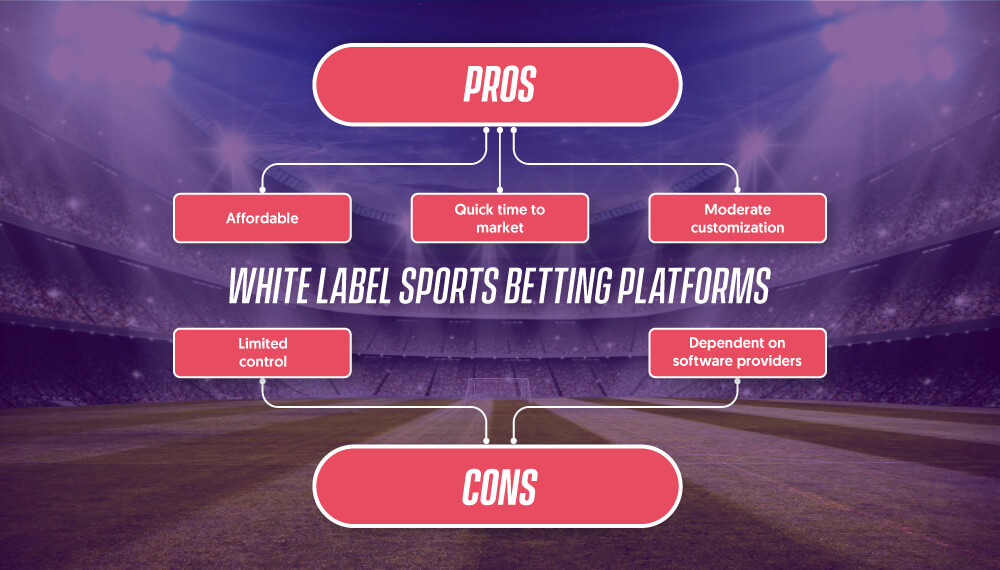
Pros:
- Affordable: White label solutions are often the most affordable option, making them ideal for small and medium-sized businesses.
- Quick time to market: White label solutions come with pre-built software, making it easy to launch a sportsbook quickly.
- Moderate customization: White label solutions offer moderate customization options, allowing bookmakers to tailor the platform to their needs.
Cons:
- Limited control: Bookmakers using white label solutions have limited control over their sportsbook's design and functionality.
- Dependent on software providers: Bookmakers using white label solutions are dependent on their software providers to maintain and update the platform.
Turnkey Sports Betting Platforms
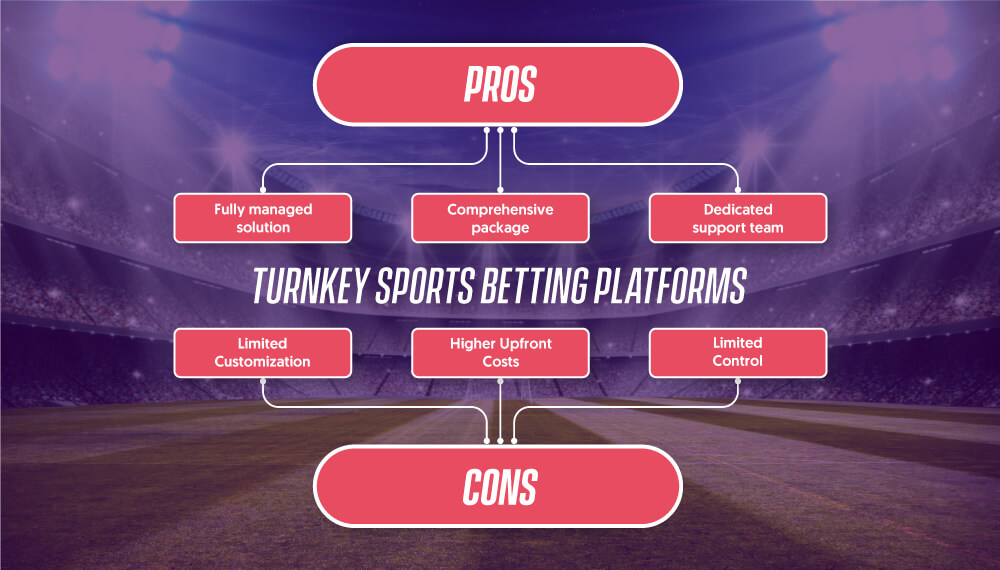
Pros:
- Fully managed solution: Turnkey solutions provide bookmakers with a fully managed solution, including software, hardware, and customer support services.
- Comprehensive package: Turnkey solutions come with a ready-made sportsbook, making it easy to launch a sports betting business quickly.
- Dedicated support team: Turnkey solutions often come with a dedicated support team that can assist bookmakers with any issues that may arise.
Cons:
- Limited Customization: Since these platforms are pre-built, you may not be able to make changes to the software to fit your specific needs. This could limit your ability to differentiate your sportsbook from others in the market.
- Higher Upfront Costs: Turnkey solutions can often come with higher upfront costs compared to white label or API solutions. This is because the entire software package is provided by the provider, including the front-end user interface, backend management system, and payment processing systems.
- Limited Control: With a turnkey solution, you have limited control over the software and its functionality. This means that you may not be able to add new features or customize existing ones, which could limit your ability to compete in the market.
API Sports Betting Platforms
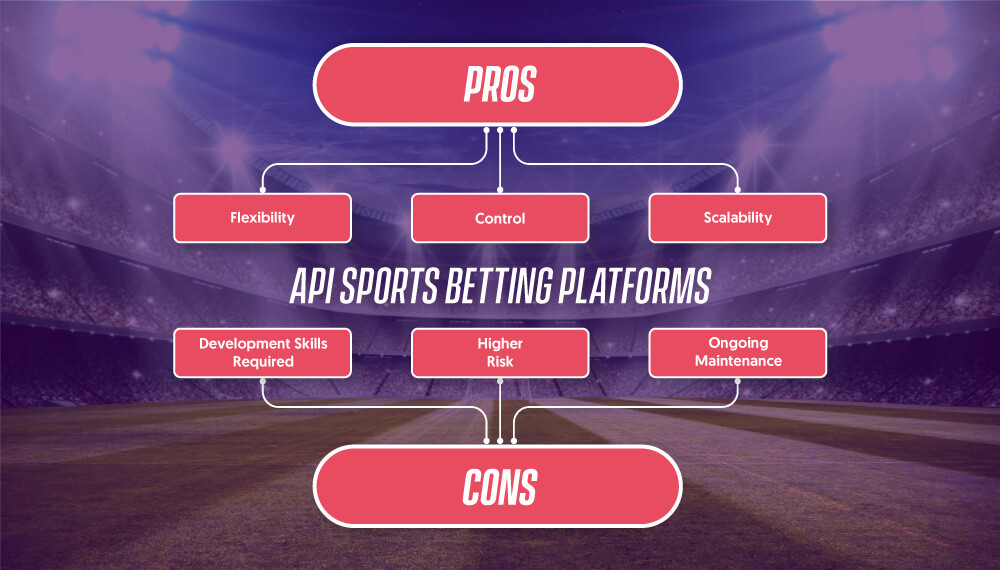
Pros:
- Flexibility: One of the main advantages of using an API sports betting platform is that it offers greater flexibility and customization compared to turnkey or white label solutions. With an API, you can build your own custom front-end interface, allowing you to create a unique user experience that is tailored to your specific needs.
- Control: Since you have direct access to the software code, you have more control over the functionality and features of your sportsbook. This means you can add or remove features as needed, and make adjustments to the software to better suit your business needs.
- Scalability:API solutions are highly scalable, allowing you to easily handle an increasing number of users and transactions as your sportsbook grows. You can add additional resources and servers as needed, without needing to invest in a whole new platform.
Cons:
- Development Skills Required: In order to use an API solution, you need to have a team of skilled developers who can build and maintain your custom front-end interface. This can be a significant investment for some businesses, especially those that are just starting out.
- Higher Risk: With greater flexibility comes greater risk. Since you have more control over the software, there is also a greater risk of introducing bugs or errors into the system. This can lead to downtime, lost revenue, and a damaged reputation.
- Ongoing Maintenance: With an API solution, you are responsible for ongoing maintenance and updates to the software. This can be time-consuming and expensive, especially if you have a large and complex system.
Overall, the decision to use a turnkey sports betting platform should be based on your specific needs and budget. While turnkey solutions can offer a convenient and easy-to-use option for launching a sportsbook, they may not be the best fit for everyone. If you require more customization or control over your sportsbook, a white label or API solution may be a better choice
Size of the Opportunity
Factors Driving the Growth of the Sports Betting Market
- Increasing Internet Penetration: With the increasing availability of the internet across the globe, there has been a massive increase in online betting. More people can now access online betting platforms with ease, leading to a surge in the number of online bettors.
- Growing Adoption of Smartphones and Tablets: The widespread adoption of smartphones and tablets has made it easier for people to access online betting platforms. These mobile devices have enabled bettors to place bets anytime, anywhere, leading to a significant increase in the number of mobile betting users.
- Legalization of Sports Betting: The legalization of sports betting in various countries has opened up new markets for online sports betting operators. This has created significant growth opportunities for the industry, and several operators are taking advantage of this.
- Increasing Disposable Income: With increasing disposable income, people are more willing to place bets on their favorite sports. This has led to a surge in the number of sports bettors, especially in the developing countries.
- Mobile Betting: The rise of mobile betting has been one of the most significant trends in the iGaming industry. Mobile devices have become the primary means of accessing online betting platforms, with over 70% of all online bets placed using mobile devices.
- In-Play Betting: In-play or live betting has become increasingly popular in recent years, with several operators offering this service. In-play betting allows bettors to place bets while a game is in progress, providing them with more opportunities to win.
- Esports Betting: Global esports betting market expected to reach USD 13 billion by 2025. Esports betting involves betting on professional video game matches, which have become increasingly popular in recent years.
- Cryptocurrency Betting: Cryptocurrency betting has emerged as a new trend in the iGaming industry, with several operators accepting cryptocurrencies as a form of payment. This has provided bettors with more options for depositing and withdrawing funds, and it also allows for faster and more secure transactions.
Importance of Reliability in Sportsbook Platforms

Choose a reputable provider
One of the most important factors in ensuring the reliability of your sportsbook platform is selecting a reputable provider. There are many sports betting software providers in the market, and it is essential to choose a provider with a proven track record of delivering reliable and high-quality solutions. Look for providers with a strong reputation and positive customer reviews.

Test and monitor your platform
Regular testing and monitoring of your platform are essential for ensuring its reliability. This includes conducting regular security audits, load testing to ensure your platform can handle high volumes of traffic, and monitoring for any issues or errors that may arise. Regular maintenance and updates are also critical for keeping your platform up-to-date and secure.

Implement redundancy and failover mechanisms
Another key strategy for ensuring the reliability of your sportsbook platform is implementing redundancy and failover mechanisms. This includes having backup servers and data centers, as well as failover mechanisms in place in case of any system failures or downtime. This helps to ensure that your platform remains available and functional at all times.

Utilize a proven sportsbook solution like iGamingBook
iGamingBook is a top-rated sportsbook solution that provides a reliable and scalable platform for sports betting operators. With over 10 years of experience in the industry, iGamingBook offers a range of customizable white label solutions that are tailored to the specific needs of each operator. iGamingBook's platform is built on cutting-edge technology, with features such as real-time odds and data feeds, a wide range of sports and markets, and a flexible and user-friendly interface. The platform also includes robust security features, including SSL encryption, DDoS protection, and fraud prevention tools, to ensure the safety and security of both operators and players. With iGamingBook, operators can rest assured that their sportsbook platform is reliable, scalable, and customizable to meet their specific needs. Whether you are a new operator looking to enter the market or an established operator looking to upgrade your platform, iGamingBook provides the perfect solution for your sports betting needs.
Conclusion
In conclusion, the iGaming industry and sports betting market are experiencing significant growth, with projections indicating continued expansion in the coming years. The rise of online betting has led to the development of various types of sports betting platforms, including white label, turnkey, and API solutions.
Choosing the right platform is crucial for success in this highly competitive market. White label solutions offer a quick and easy way to enter the market, with minimal upfront costs and technical expertise required. Turnkey solutions provide a more customised approach, allowing operators to tailor the platform to their specific needs. API solutions offer a flexible option for those who have their own technology or want to integrate with third-party providers.
When deciding on a platform, operators need to consider factors such as cost, time to market, level of control, and scalability. Each type of platform has its own pros and cons, and the choice ultimately depends on the operator’s specific needs and goals.
Overall, the sports betting market is being driven by factors such as increasing legalisation of sports betting, growing popularity of online betting, advancements in technology, and changing consumer behavior. As the market continues to grow, there will be new opportunities for operators to enter and succeed in this lucrative industry.
FAQs
White label platforms are pre-built and customizable, while turnkey solutions are fully functional and ready to launch.
An API platform allows developers to integrate specific sports betting functionalities into their own applications.
It depends on factors like budget, customization needs, and technical expertise.
Cost, reliability, scalability, customization, and security.
The market size is expected to surpass USD 129.3 billion by 2028, with significant growth projected in the coming years.
Factors include increasing legalisation, technological advancements, and changing consumer preferences.
Choose a reputable provider with a track record of delivering reliable, secure, and scalable solutions.
Turnkey and white label betting solutions both offer pre-built platforms for operators, but with key differences. Turnkey solutions provide a complete, ready-to-go platform with limited customization, while white label solutions offer greater flexibility and customization but require more involvement from the operator.



